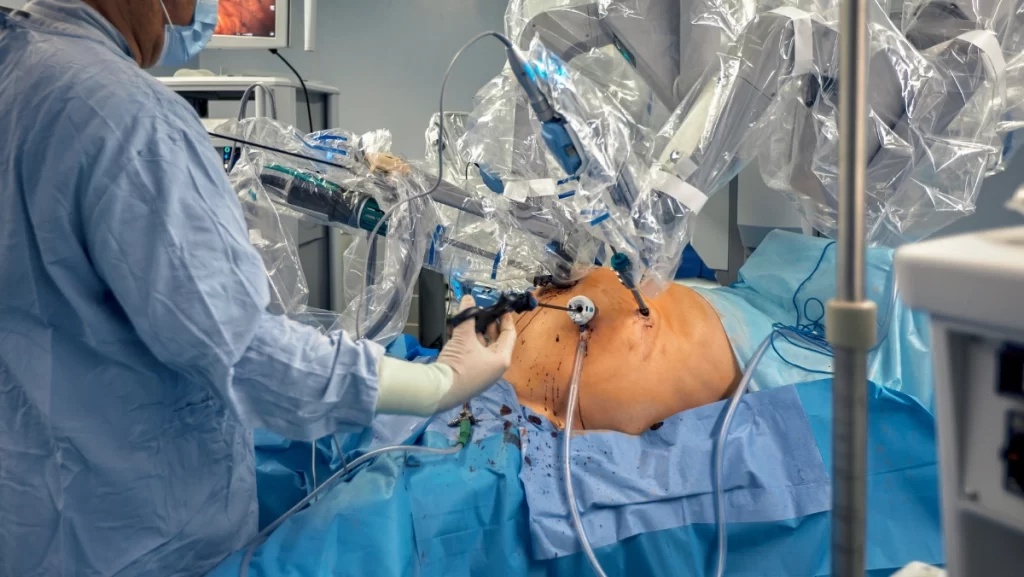Overview
Laparoscopic gynecological surgery uses small incisions and a camera to allow doctors to look inside your pelvis and treat various conditions. Instead of large cuts, surgeons use tiny instruments and a thin, lighted tube known as a laparoscope. This method significantly reduces recovery time and post-surgery discomfort.
Laparoscopy in obstetrics and gynecology has changed the way doctors treat many common conditions. This surgical method has made it easier for both doctors and patients to manage issues like ovarian cysts, high risk pregnancies, and fibroids without the need for open surgery.
Key Benefits:
- Smaller scars
- Reduced hospital stay
- Faster recovery
- Lower infection risks
Patients seeking laparoscopic gynecological surgery in Chennai have access to some of the best facilities and doctors, offering advanced and safe care.
Types of Laparoscopic Gynecological Surgery
Laparoscopy in obstetrics and gynecology covers various minimally invasive procedures that address reproductive health issues with precision. Common types include:
- Diagnostic Laparoscopy: Used to investigate pelvic pain, infertility, or unexplained symptoms.
- Hysterectomy: Removal of the uterus for conditions like fibroids or cancer.
- Ovarian Cystectomy: Extraction of ovarian cysts while preserving ovarian function.
- Endometriosis Surgery: Removal of endometrial tissue growing outside the uterus.
- Myomectomy: Surgical removal of fibroids to preserve the uterus.
- Tubal Ligation: A permanent contraception method by blocking or cutting the fallopian tubes.
These procedures offer several advantages, such as smaller incisions, reduced blood loss, and quicker recovery times compared to traditional surgeries. Laparoscopic gynecological surgery is particularly beneficial for women seeking fertility treatments or managing chronic pelvic pain.
With advancements in technology, surgeons use specialized instruments and cameras to perform these procedures with exceptional accuracy, minimizing risks and enhancing outcomes. Patients should discuss the appropriate type of laparoscopic surgery with their healthcare provider to address their specific condition effectively.
Symptoms That May Lead to Laparoscopic Gynecological Surgery
Certain symptoms might indicate the need for laparoscopic gynecological surgery. It’s important to consult with a gynecologist if you’re experiencing any of the following issues:
Common Symptoms
- Chronic pelvic pain
- Heavy or irregular periods
- Pain during intercourse
- Severe cramps
- Infertility issues
If these symptoms are affecting your daily life, your doctor may suggest a laparoscopic gynecological surgery to diagnose and treat the underlying condition. For those in Chennai, specialized clinics for laparoscopic gynecological surgery in Chennai offer expert care for these issues.
Treatment Options: Spotlight on Deepa Hospital
When considering laparoscopic gynecological surgery, Deepa Hospital in Chennai stands out as one of the top choices for women seeking advanced and compassionate care. The hospital offers a range of laparoscopic procedures in gynecology, tailored to meet each patient’s individual needs.
Why Choose Deepa Hospital?
- Experienced Surgeons: The hospital’s gynecological team is highly skilled in performing both basic and complex laparoscopic gynecological surgeries.
- Cutting-Edge Technology: Deepa Hospital is equipped with the latest medical technologies to ensure precision and safety during surgery.
- Comprehensive Care: From initial diagnosis to post-surgery recovery, Deepa Hospital provides end-to-end care.
Patients who need laparoscopic gynecological surgery in Chennai can trust Deepa Hospital for world-class treatment and care in a comfortable environment.
Recovery After Laparoscopic Gynecological Surgery
Recovery from laparoscopy in obstetrics and gynecology is generally quicker compared to traditional open surgery, allowing patients to resume normal activities sooner. Most individuals experience minimal discomfort, manageable with prescribed medications. Post-surgery, follow these guidelines for a smooth recovery:
- Rest: Avoid strenuous activities for the first few days.
- Diet: Start with light meals and gradually return to your normal diet.
- Hydration: Drink plenty of fluids to aid healing.
- Wound Care: Keep the incision area clean and dry.
- Follow-ups: Attend all post-surgery appointments to monitor recovery.
Patients may experience mild bloating or cramping, which usually subsides within a few days. Full recovery may take one to two weeks, depending on the procedure’s complexity. Women undergoing laparoscopic gynecological surgery often notice improved quality of life as symptoms like pain or discomfort caused by the treated condition diminish.
Common procedures, such as ovarian cyst removal or endometriosis treatment, involve minimal risks, but patients should watch for signs of complications like excessive bleeding or fever and contact their doctor promptly.
By following medical advice and practicing self-care, patients can recover effectively and return to their daily routines.
Prevention: How to Minimize Future Gynecological Issues
While laparoscopic gynecological surgery is an effective treatment for many conditions, there are steps you can take to prevent future problems.
Tips for Prevention:
- Regular Gynecological Checkups: Early detection is key to managing issues before they worsen.
- Healthy Diet and Exercise: Maintaining a healthy lifestyle can reduce the risk of developing conditions like fibroids or endometriosis.
- Listen to Your Body: Don’t ignore symptoms like abnormal bleeding or pelvic pain.
By taking proactive steps, you can minimize the chances of needing future laparoscopic procedures in gynecology.


